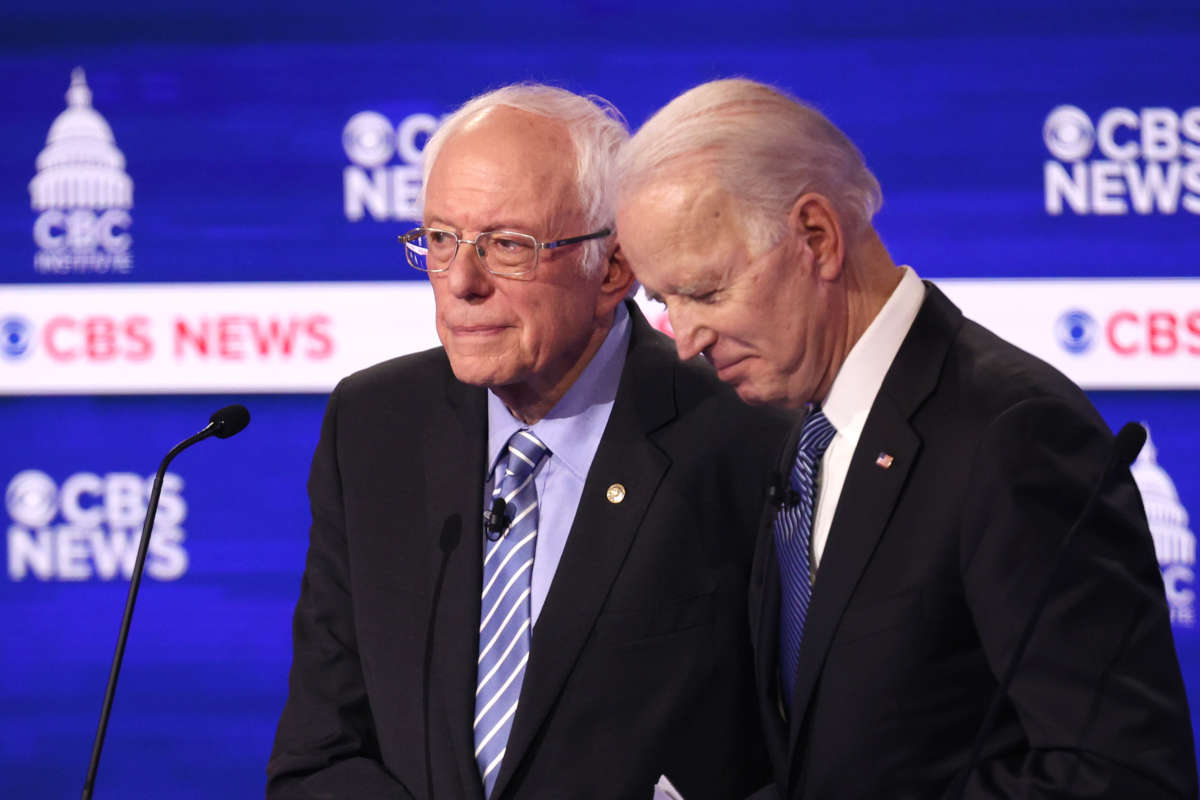Sen. Bernie Sanders and supporters of his presidential campaign took on 2020 Democratic primary foe former Vice President Joe Biden’s record on trade to sharpen the contrasts between the two candidates ahead of next week’s nominating contests in six states, including the Rust Belt state of Michigan.
Just before leaving Phoenix to attend a rally in Michigan on Friday, Sanders held a brief press conference in which he said Biden’s vote as a then-senator for the 1994 North American Free Trade Agreement (NAFTA) showed a “fundamental difference” between the two candidates.
“In terms of the coming general election we don’t have to predict what [President Donald] Trump will be saying about Joe Biden, because he is already making those attacks. Trump — who won Michigan, who won Wisconsin, who won Pennsylvania — made one of his major campaign tenets his opposition to NAFTA and PNTR [Permanent Normal Trade Relations ] with China,” said Sanders.
“In 2016, he criticized those trade policies as being disastrous — and just yesterday, he made that claim,” Sanders continued. “The truth is, and we have to be honest about this, that NAFTA and PNTR cost this country well over 4 million good paying jobs. In Michigan alone, these disastrous trade agreements led to the loss of more than 150,000 good paying jobs. And not only job loss — when good paying jobs go, you are involved in a race to the bottom and employers can pay lower wages.”
“These trade agreements have been a disaster for the people of Michigan, the state of Vermont, and for the entire country. Joe Biden and I have very strong and different positions in terms of how we reacted to NAFTA and PNTR,” Sanders said.
Back when the votes were taken, he continued, “I can remember it like it was yesterday, I was on a picket line in Montpelier, Vermont with workers opposing these disastrous trade agreements. I vigorously opposed these agreements; I helped lead the opposition to these agreements. Joe Biden supported those agreements. And that is a fundamental difference about our approach toward the trade union movement and towards the needs of working people.”
Biden’s vote for the deal has been easy fodder for Trump attacks.
“Joe Biden made a deal, NAFTA,” the president said Thursday at an event in Scranton, Pennsylvania. “He approved it, he was pushing it. It’s the worst trade deal ever made.”
According to Sanders campaign manager Faiz Shakir, the president’s comments are simply more evidence Sanders would be a better candidate to go up against Trump in the general election.
Think hard about the campaign that can truly take it to Trump https://t.co/ZSnGFObWOi
— Faiz (@fshakir) March 6, 2020
The Sanders campaign appears to be making sure voters in communities harshly hit by so-called free trade deals won’t forget Biden’s record. The campaign rolled out this week three new televsion ads, including one focused on trade.
That ad features union autoworker Sean Crawford, who speaks about how his community has been “decimated by trade deals.”
“Only one candidate for president consistently opposed every disastrous trade deal,” says Crawford, “and that candidate is Bernie Sanders.”
In an article entitled “Biden’s Nafta Vote Is a Liability in the Rust Belt” and published last May at Bloomberg Businessweek, Joshua Green wrote that the trade deal
led to an exodus of U.S. manufacturing jobs to Mexico and hurt wages for U.S. workers who held on to their jobs. Throughout the 2016 presidential campaign, Trump pilloried Nafta as a “disaster” and “the worst trade deal ever,” a message his top advisers believe was pivotal in helping him carry critical Rust Belt states once considered Democratic strongholds.
“Nafta still resonates in the industrial Midwest and Rust Belt,” says Stanley Greenberg, a veteran Democratic pollster who recently conducted focus groups on trade in Michigan and Wisconsin. “There’s still a lot of anger because it symbolizes, for many people, the indifference about the outsourcing of jobs and the favoring of elite economic interests in international trade agreements.”
The youth-led Sunrise Movement shared that article Friday morning with a tweet suggesting it provided evidence Sanders should get the Democratic ticket.
Who should debate Trump on trade?
❌ @joebiden killed jobs in Michigan and supercharged the climate crisis #NAFTA
✅ @berniesanders will create millions of good jobs to stop the climate crisis and reverse the damage of bad trade deals. #GreenNewDealhttps://t.co/PdUhWPlmBS
— Sunrise Movement 🌅 (@sunrisemvmt) March 6, 2020
In addition to Michigan, Idaho, Mississippi, Missouri, North Dakota, and Washington will hold primaries Tuesday.
Media that fights fascism
Truthout is funded almost entirely by readers — that’s why we can speak truth to power and cut against the mainstream narrative. But independent journalists at Truthout face mounting political repression under Trump.
We rely on your support to survive McCarthyist censorship. Please make a tax-deductible one-time or monthly donation.
